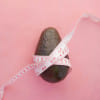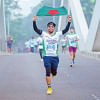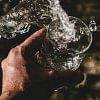As the summer sun blazes down, Eid arrives after a month of fasting, bringing with it joyous feasts and heartfelt celebrations. But with the rising temperatures, dehydration can become an unexpected challenge, especially after long fasting hours.
While indulging in festive delicacies, it's essential to prioritise hydration — both for energy and overall well-being. From water-rich fruits to refreshing drinks, making smart choices can ensure that your Eid is both delicious and revitalizing.
This Ramadan, thirst is perhaps a bigger concern than hunger, for most. As acutely felt as it is, most people do not track their liquid consumption, and the result is dehydration and related health issues.
From maintaining the right balance of electrolytes to providing the right nutrients, the role of water is crucial! Thus, after continuous fasting, halfway through the month, you may find yourself constantly parched and dehydrated.
Forgetting to drink enough fluids during Ramadan is hardly uncommon, given that most of the non-fast time is also the time we sleep. So, how do you stay hydrated during Ramadan?
The simplest solution — drink plenty of water! Break your fast with at least one glass, and keep sipping throughout the night. Avoid chugging too much at once. Finally, drink around two glasses of water during sehri to stay hydrated throughout the day.
If you are not a fond of drinking water, don't worry! There are plenty of fruits and vegetables with high water content that you could try instead. Opt for fruits like watermelons, and oranges or finish your iftar with vegetable soup. Alternatively, put a few lemon slices or mint leaves into your water for a fresh, subtle flavour.
No matter how much of a coffee-addict or a tea-lover you are, Ramadan is the time to refrain from these! Stimulant drinks act as diuretics and can cause dehydration faster. If you are worried about weight gain during Ramadan, stay away from calorie-rich sugary drinks during iftar and stick to plain lemon water or cucumber water!
Our body can be dehydrated due to excess sweating while travelling in hot and humid weather and surroundings. Oral rehydration saline can be of great use in this regard. We often forget about this simple measure.
Alternatively, take plenty of liquid like water, green coconut water, juice etc. while heading home for a joyous Eid. Be careful about drinking safe water and a good source of liquids like juice and drinks, otherwise, they can be harmful causing diarrhoea and other waterborne diseases.
Eid in the summer calls for a feast that balances indulgence with hydration. Traditional dishes like biryani, korma, and kebabs are essential, but it's equally important to include cooling foods and drinks. Fresh fruit platters, yogurt-based drinks like borhani, and refreshing sherbets help beat the heat while aiding digestion. Hydration is key after a month of fasting, so sipping on infused water, coconut water, or lemonade throughout the day can prevent dehydration. A well-rounded Eid feast not only satisfies the taste buds but also keeps the body refreshed and energised in the summer heat.







Comments